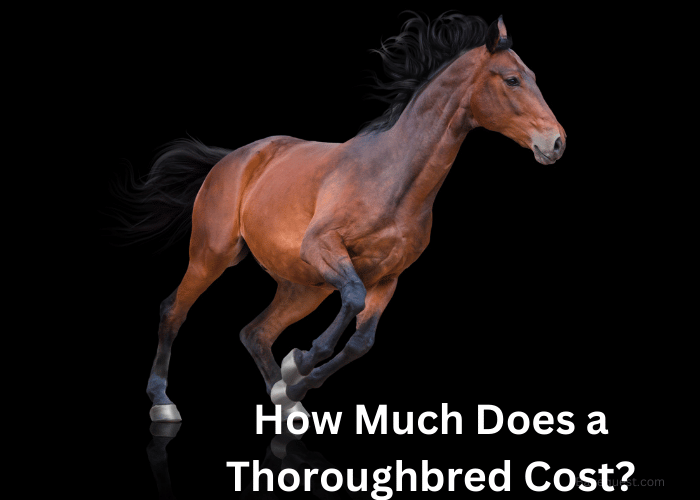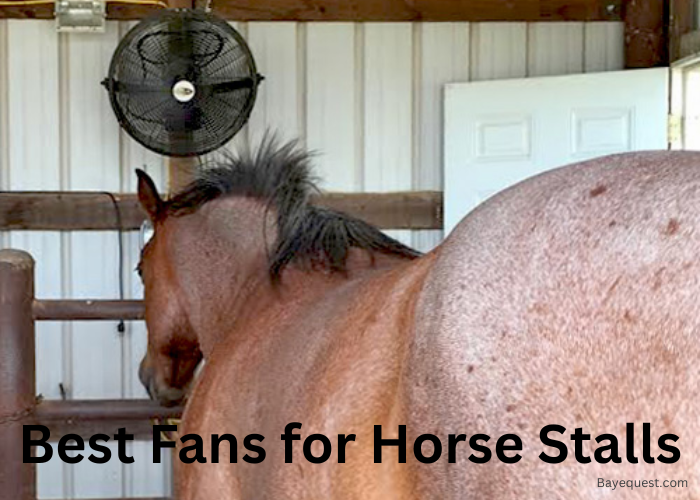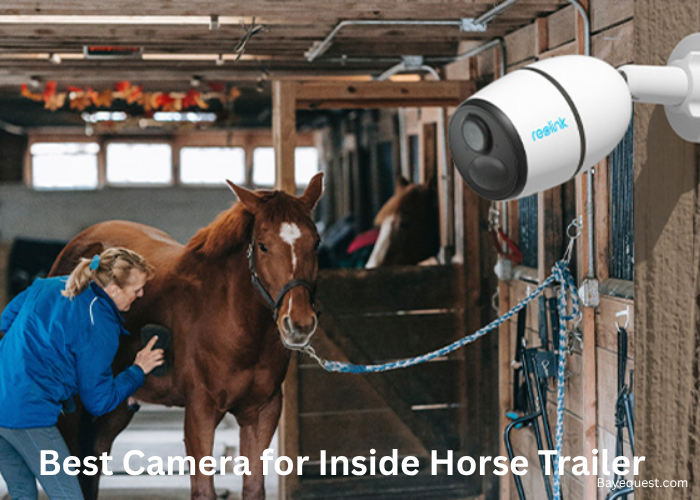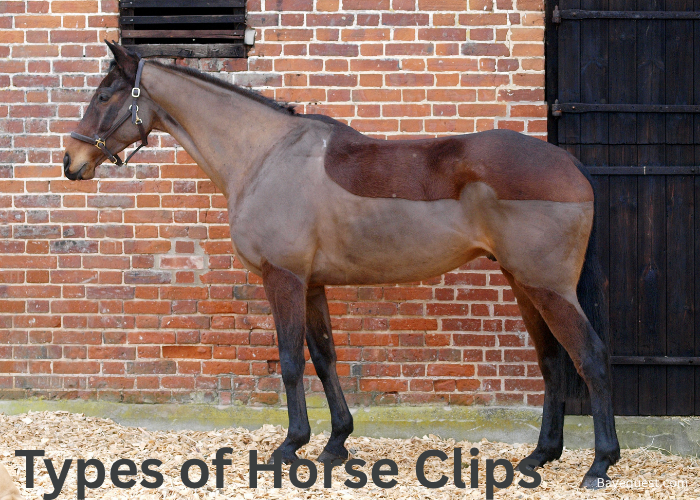Ever thought about owning a racehorse? It’s not as out of reach as you might think. Sure, the stars of the Kentucky Derby can cost a fortune, but knowing the real price of a thoroughbred might make your dream possible.
Whether you’re a big fan of horse races or looking to invest in the thrill of the track, this article is for you.
We will show you what it costs to own one of these speedy horses, from buying to caring for them. We’ve got all the details.
How Much Does a Thoroughbred Horse Cost? Key Takeaway
Thoroughbred race horses cost between $10,000 to $30,000. These elite racehorses are prized for their physical prowess in competitions. However, you have to consider that the annual upkeep for a Thoroughbred can be substantial, covering training, healthcare, and other maintenance expenses.
What Exactly is a Thoroughbred Horse?
A thoroughbred horse is special, not just any horse. Its family tree goes way back. These horses have done it all – from being someone’s ride, helping on farms, to charging into battles. Now, they’re mostly known for racing.
What makes them stand out is their bloodline. It’s all written down, showing their rich history. This is a big deal when you’re looking to buy a racehorse.
The word ‘thoroughbred’ often makes people think of expensive, fancy racehorses. But are they as pricey as they sound? That’s the question we’re diving into.
Interesting read: What’s the Difference Between a Thoroughbred and a Quarter Horse?
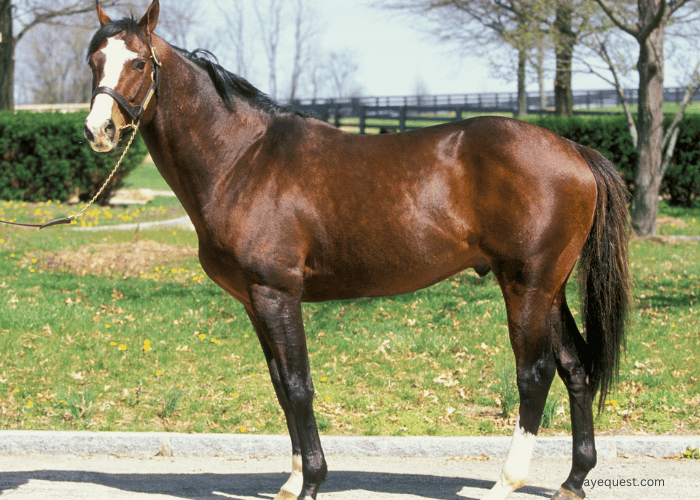
Understanding Horse Sale Terms
When you’re looking for a horse to buy, certain phrases can tell you a lot about the horse. Here’s what to keep an eye out for:
Broodmare Only: This term suggests the horse might have health issues preventing it from being ridden.
Companion Horse Only: These horses can’t be ridden. They’re just there to keep other horses company.
Good Foundation; Needs Finishing: This means the horse has basic training and is suitable for someone just past beginner level.
Grade: A “grade” horse doesn’t have a known family tree. It might look like a certain breed but doesn’t have a recorded breeding history.
Green Broke: A horse described as “green broke” is okay with a saddle but not fully trained. It’s not used to different riding cues yet.
Husband Horse: This is a horse that’s good for irregular riders. It’s easy-going, takes care of its rider, and is great for beginners.
Prospect: This is a horse that the owner thinks could be good at certain activities with more training.
Rides E/W: The horse is trained for English and Western riding styles.
Ring Sour: These horses have been shown a lot and might be tired of competing.
UTD on Shots and Worming: The horse is up-to-date with vaccinations and deworming.
Willing Over Fences: A horse that jumps well and doesn’t shy away from fences.
Needs Advanced Rider: This horse can be a handful and is best suited for experienced riders.
What’s the Monthly Cost of Owning a Racehorse?
Step 1: The Primary Expenses
Your horse trainer is the main cost of owning a racehorse. In Southern California, for instance, top trainers charge a daily rate of around $120. Yet, even renowned trainers like Mike Puype and Phil D’Amato usually ask for about $85 – $95 per day. This rate covers:
- Staff: Assistants, grooms, hot walkers, exercise riders
- Taxes and workers’ compensation
- Horse care: Feed, bedding, vitamins, and supplies like bandages and tack
Trainers often say their profit doesn’t come from this daily rate but rather a 10% share of the horse’s earnings.
Your horse will unlikely be in training every day of the year, as they need rest periods. During these times, the cost for farm care is typically around $50 per day.
Step 2: Additional Monthly Costs
Beyond the trainer’s day rate, there are other regular expenses:
- Blacksmith: $80-$100 per month
- Veterinarian: $200-$1,500 per month
- Dentist and chiropractor: Around $75 each per month
If you’re part of a horse racing partnership, you might also pay for accounting and monthly management fees.
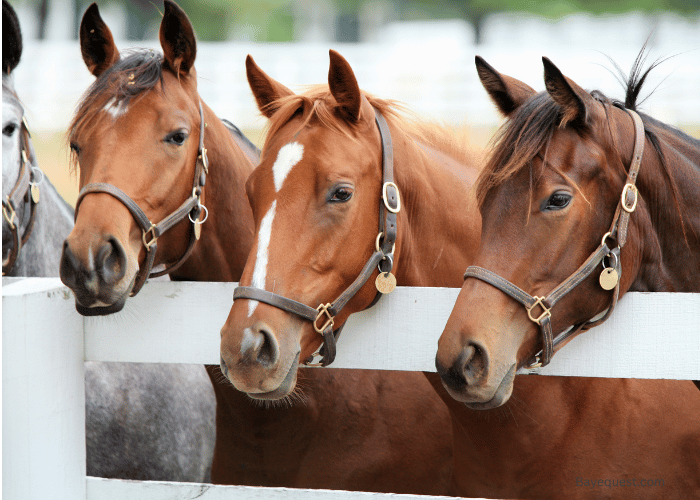
What’s the Annual Expense of Owning a Thoroughbred Horse?
Owning a thoroughbred horse, especially for racing purposes, involves a range of expenses beyond the initial purchase.
The annual costs can vary significantly based on several factors. Here’s a detailed breakdown.
| Expense Category | Annual Cost |
|---|---|
| Full-Boarding Services | $12,340 |
| Part-Time Boarding | $10,630 |
| Home Care | $5,707 |
| Healthcare (Monthly) | $500 (Monthly) |
| Farrier Services (Annually) | $450 – $750 |
| Supplies and Equipment | Varies |
| Trainer & Jockey Commissions | 10% of winnings |
| Accounting for Partnerships | Varies |
| Entry Fees for Major Races | 1%-2% of race purse |
Boarding Costs
Boarding your thoroughbred is another significant expense. Full-boarding services average around $12,340 per year, while part-time boarding is about $10,630 annually.
If you can care for your horse at home, the costs drop to approximately $5,707 annually. These figures include hay, feed, supplements, bedding, waste removal, and healthcare costs.
Healthcare Expenses
Regular veterinary care is essential for thoroughbreds, especially those involved in racing.
This includes routine check-ups, vaccinations, deworming, and emergency care. Setting aside a budget for unforeseen medical expenses is also prudent. The typical monthly medical care costs around $500.
Farrier Services
Regular farrier visits are vital for maintaining the horse’s hooves and overall foot health.
These services, required every 4-6 weeks, can add up to annual costs of around $450 to $750.
Supplies and Equipment
The cost of supplies like saddles, bridles, grooming tools, and other equipment can vary widely.
Additionally, if your horse competes, you may need to invest in specific gear for events.
Trainer & Jockey Commissions
These aren’t fees but rather percentages taken from any winnings. Both the trainer and jockey generally receive 10% of winnings and 5% for second or third places.
Accounting
Partnerships may charge for accounting and yearly tax preparation. As an owner, you’ll need to manage bills and tax records. It’s often best to hire an accountant familiar with horse racing.
Remember, owning a racehorse involves various costs, and planning for them is key to successfully managing your horse racing business.
Extra Fees and Commissions
Entry Fees: Surprisingly, entering a horse in most races is free, except for stakes races like the Kentucky Derby or Breeders’ Cup.
These can cost upwards of $120,000, but with high stakes come high rewards. The entry fee is typically 1%-2% of the race purse.
Where to Buy Thoroughbred Horses
There are a few good places to start looking.
Horse Auctions and Sales
First up, think about horse auctions and sales. These happen at racetracks and special horse auction spots.
Big ones like Keeneland in Kentucky or Tattersalls in England have all kinds of thoroughbreds. You can see lots of horses, check them out, and then bid on your favorite. But, it’s smart to bring someone who knows their stuff, like a trainer or agent, to help you out.
Racing Stables and Training Places
Then, there are racing stables and training places. Sometimes trainers or owners sell horses right from their stables, especially if the horse isn’t racing anymore.
This way, you learn more about the horse, like its history and behavior.
Online Horse Shopping
Now, with the internet, you can also look for horses online. There are websites where people list thoroughbreds for sale, such as our marketplace.
It’s easy and you can find all kinds of horses. Just make sure you do your homework and, if you can, go see the horse yourself before buying.
Retirement and Rescue Groups
If you’re not after a racing horse, check out retirement and rescue groups.
They have thoroughbreds that used to race and now need a new home or a different kind of job. This is a great way to get a horse, and it’s often not too expensive.
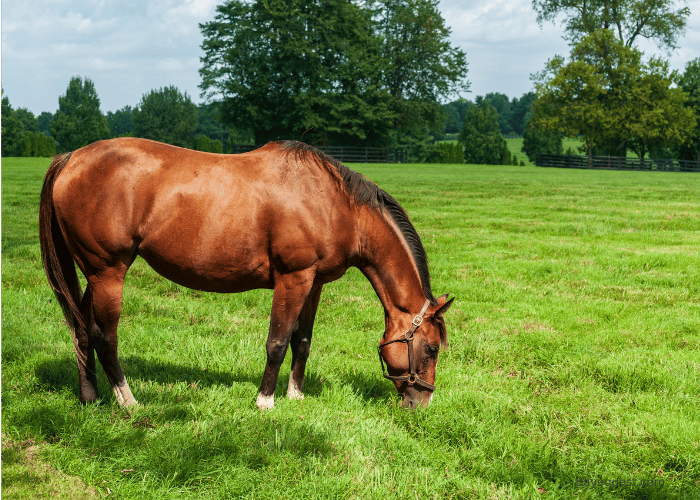
What Makes a Thoroughbred Horse Cost So Much?
Here’s what makes their prices go up or down.
Family History
First, it’s about who their family is. If the horse comes from a line of champions, it’ll cost more. People think a horse with a fancy family will race better.
How Old and Trained They Are
Next, think about their age and training. A young horse, like a foal, is cheaper than an older horse ready to race. Training a horse for racing costs a lot, which adds to the thoroughbreds horse price.
Are They Healthy?
Health is super important. A horse in top shape, without any health problems, is worth more. Buyers usually get a vet to check the horse to make sure it’s healthy.
How Good Are They in Races?
Then, there’s how they do in races. A horse that wins a lot or looks like it could win a lot is more expensive.
What’s Everyone Else Buying?
Lastly, it’s about what’s popular and rare. When lots of people want thoroughbreds, prices go up. And if a horse has something special, like a rare color, it can be pricier.
Are Thoroughbreds Horses Good for Beginners?
Thoroughbreds are famous for their roles in horse racing. They’re fast, energetic, and sensitive. Handling all that energy and quick response can be pretty tough for someone just starting out with horses.
See, thoroughbreds are used to the fast-paced world of racing. If you’re new to riding, you might find it hard to keep up with them. They react quickly to what you do and need someone who knows their way around horses to guide them.
But, it’s not all challenges. Thoroughbreds are smart and they learn fast. If you’re ready to put in the time and patience, you can teach them to be great at different riding styles. It’ll be a big commitment, but it could also be rewarding.
Now, taking care of any horse is a big job. Thoroughbreds need a lot of attention, especially regarding their diet, health, and exercise. As a first-time horse owner, this can be a lot to handle.
So, are thoroughbreds good for beginners? Well, they’re amazing horses, but they might be a bit too much for someone just starting out. Start with a calmer breed and then think about a thoroughbred when you have more experience.
What Varieties Exist Within Thoroughbred Horse?
When we talk about thoroughbred horses, we’re talking about one kind of horse. They’re all part of the same family, famous for horse racing. But within this family, each horse is a bit different.
Some thoroughbreds are tall and slim, great for races that are long. Others are shorter and more muscular, perfect for quick sprints. Their colors vary too, with shades like brown, black, chestnut, and grey.
What’s cool is all thoroughbreds trace back to three main horses from way back. The big names are;
- Darley Arabian,
- Godolphin Arabian
- Byerly Turk
This shared history is what makes a thoroughbred a thoroughbred.
Distinguishing Between Thoroughbred and Standardbred Horses
Thoroughbreds and Standardbreds are both racehorses, but they’re pretty different. Thoroughbreds are the ones you see in fast races, like the Kentucky Derby.
They’re tall, lean, and built for speed. They can cover distances fast, running anywhere from a half-mile to a mile and a half. They’re full of energy and come from England originally.
Standardbreds, though, they’re in harness racing. That’s where they pull a little cart, called a sulky.
They’re more muscular and a bit shorter than thoroughbreds.
Standardbreds are known for being steady and calm. They’re good at two types of walking – trotting and pacing – not the galloping that thoroughbreds do. These horses come from the U.S., and people use them for racing and just for fun riding too.
Interesting read: How Fast Can a Horse Run?
How Much Does a Thoroughbred Racehorse Cost? Conclusion
So, how much does a thoroughbred horse cost? Well, it depends. A horse just for fun riding might cost around $10,000.
But if you’re looking at a racehorse from a famous line, the price can shoot way up, sometimes into the hundreds of thousands.
Remember, buying the horse is just the start. There’s also the cost of keeping the horse – things like training, a place to live, looking after its health, and all the gear it needs.
If you’re thinking about getting into horse racing or just want a horse to ride, it’s important to consider all these costs. Owning a thoroughbred can be exciting and rewarding, but it’s a big commitment, too.




